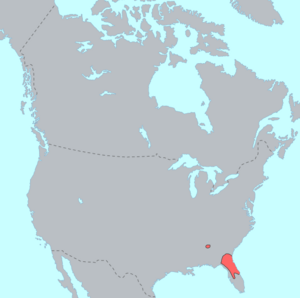Tawasa language facts for kids
Quick facts for kids Tawasa |
||||
|---|---|---|---|---|
| Teouachi | ||||
| Native to | United States | |||
| Region | eastern Alabama | |||
| Ethnicity | Tawasa people | |||
| Extinct | 18th century | |||
| Language family |
Timucuan?
|
|||
| Linguist List | tjm-taw | |||

Pre-contact distribution of the Timucua language (Florida) and Tawasa
|
||||
|
||||
Tawasa was a Native American language that is now extinct. This means no one speaks it anymore. It was likely spoken by the Tawasa people, who lived in what is now Alabama. We only know about the Tawasa language from a list of words. This list was written down in 1707 by a man named Lamhatty, who was a Tawasa.
Experts have studied this word list to understand the language better. Some think Tawasa was a type of Timucua language, which was spoken in Florida. Others believe it was a separate language but still related to Timucua. There's also a debate about whether Lamhatty was truly Tawasa. The language shows some connections to Muskogean languages, like the Alabama language.
Contents
How We Know About Tawasa
In 1707, an Indigenous man named Lamhatty arrived in the British colony of Virginia. He ended up at the home of Colonel John Walker. Walker was interested in Lamhatty's story and introduced him to a historian named Robert Beverley.
Lamhatty's Journey
Through an interpreter, Lamhatty explained his journey. He said he was from a village called Tawasa near the Gulf of Mexico. He had been captured and enslaved by the Tuscarora people. They took him east and sold him to the Savannah people. Lamhatty managed to escape and traveled north until he reached Virginia.
Colonel Walker wrote down about 60 words he learned from Lamhatty. This word list was written on the back of a letter. Robert Beverley also wrote down Lamhatty's story. Sadly, Beverley noted that Walker started treating Lamhatty like a slave once he found out other Tawasa people were enslaved. Lamhatty escaped again and was never seen or heard from after that.
What Experts Think
Since then, experts have discussed where Tawasa fits among other languages. In the early 1900s, John R. Swanton noticed how similar Tawasa words were to the Timucua language. He thought Tawasa might be a link between Timucua and Muskogean languages.
Another linguist, Julian Granberry, believes Tawasa was a dialect of Timucua. However, some, like John Hann, are not sure if Beverley's story is completely accurate. They even question if Lamhatty was truly a Tawasa person.
Tawasa Words and Meanings
It can be a bit tricky to understand Tawasa words today. This is because the English speakers who wrote them down spelled them differently. For example, oo or ou in Tawasa often meant the sound u in Timucua.
Some Tawasa words also have an extra t at the end. This t might be a suffix from a Muskogean language. A suffix is a small part added to the end of a word. Other Tawasa words seem to have -la, which is a linking word in Timucua. The Timucua examples below are from the Mocama dialect.
| Tawasa | Timucua | Meaning |
|---|---|---|
| effalàh | efa-la | dog |
| písso | pesolo | bread |
| soúa | soba | meat |
| pítcho-t | picho | knife |
| ocoò-t | ucu | drink |
| heă-t | hiyaraba | cat |
| yáukfah | yanqua | 1 |
| eúksah | yucha | 2 |
| hóp-ho | hapu | 3 |
| checúttah | cheqeta | 4 |
| márouah | marua | 5 |
| mareékah | mareca | 6 |
| pekétchah | piqicha | 7 |
| pekénnahough | piqinaho | 8 |
| peétchcuttah | peqecheqeta | 9 |
| toómah | tuma | 10 |
| tomo-eúcha | tuma-yucha | 20 |
| foóley | hue-le | hand |
| hewéenou | hinino | tobacco |
| ocut-soúa | ucuchua | door |
| oū | ho | I |
| hé | he | you |
| uēkqūah | ca | here |
| uēkheth | heqe | there |
| hĕmèh | hime | come |
| héwah | hiba | sit down |
| loókqŭy | (a)ruqui | boy |
| néăh | nia | woman |
| wiedōō | biro | man |
| colúte | colo | bow |
| wiéo-tt | ibi | water |
| wiéo-tt opù-t | ibi-api | salt water |
| yōwe | yayu | great |
| chicky, chiéky | chiri, qichi | little |
| sōquàh | chuca | how many |
Similarities with Other Languages
Some Tawasa words show connections to both Muskogean and Timucua languages. This is interesting because it suggests the Tawasa language might have borrowed words or been influenced by its neighbors.
| Tawasa | Muskogean | Timucua | Meaning |
|---|---|---|---|
| chesapà | Alabama: časi | tapola | maize |
| hássey | Alabama: haši | ela | sun |
| ássick | Alabama: haši | acu | moon |
| chénah, chénoh | Natchez: ičina | oqe | he |
| tútcah | Creek: tó'tka | taca | fire |
Even though the Tawasa word for 'moon' (ássick) looks like an Alabama word, its related phrases are Timucuan. This shows how languages can mix and share parts.
| Tawasa | Timucua | Meaning | Notes |
|---|---|---|---|
| ássick hóomah | acu homa | full moon | homa means 'finish' |
| ássick-toúquah | ela-toco | east | ela-toco means 'sun-come out' or 'sunrise' |
| ássick-eachah | ela-echa | west | ela-echa means 'sun-enter' or 'sunset' |
 | Aaron Henry |
 | T. R. M. Howard |
 | Jesse Jackson |

